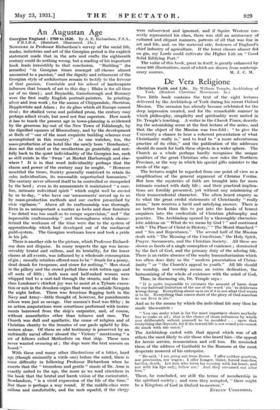De Vera Religione
Christian Faith and Life. By. William Temple, Archbishop of York. (Student Christian Movement. 3s.)
Tins little book contains the text of the eight lectures delivered by the Archbishop of York during his recent Oxford Mission. The occasion has already become celebrated for the deep impression created, and for the remarkable manner in which philosophy, simplicity and spirituality were united in Dr. Temple's teaching. A writer in the Church Times, describ- ing the astonishing scene at the first lecture of the series, said
that the object of the Mission was two-fold : " to give the University a chance to hear a coherent presentation of what Christianity really is," and to lead to " a more adventurous practice of its ethic," and the publication of the addresses should do much for both these objects in a wider sphere. The Church as a whole perhaps hardly recognizes the unique qualities of the great Christian who now rules the Northern Province, or the way in which his special gifts minister to the needs of the age.
The lectures might be regarded from one point of view as a simplification of the general argument of Christus Veritas. But here the mysteries of faith are brought into far more intimate contact with daily life ; and their practical implica- tions are forcibly presented, yet without any minimizing of their transcendental character. The often heard enquiry as to what the great credal statements of Christianity " really mean," here receives a lucid and satisfying answer. There is no better book than this to put into the hands of honest
enquirers into the credentials of Christian philosophy and practice. The Archbishop opened by a thoroughly character- istic address on " What do we mean by God ? " and continued with " The Place of Christ in History," " The Moral Standard " and " Sin and Repentance." The second half of the Mission dealt with " The Meaning of the Crucifixion," the Holy Spirit, Prayer, Sacraments, and the Christian Society. All these are shown as facets of a single conception of existence ; dominated by the fact of God, and the primary duty of the adoring life. There is an entire absence of the washy humanitarianism which too often does duty as the " modern presentation of Christ- ianity " or " the Church's appeal to youth." All life should be worship, and worship means an entire dedication, the harmonizing of the whole of existence with the mind of God.
Thus, in discussing sin, Dr. Temple says :
" It is quite impossible to estimate the amount of harm done by our habitual limitation of the use of the word ' sin ' to deliberate wrong-doing. Everything about us is sin if it is not what God wants it to be. Everything that comes short of the glory of God manifest in our lives is sin."
And as to the means by which the individual life may thus be made theocentric
" You can make what is far the most important choice anybody has to make at all ; that is the choice of those influences by which you deliberately submit yourself to be moulded . . . upon that everything else depends, for if the inward life is not sound you cannot do much with the outer."
The Archbishop ended with that appeal which was of all others the most likely to stir those who heard him—the appeal for heroic service, renunciation and self loss. He reminded them of the address of Garibaldi to the Romans at the most desperate moment of his enterprise.
" He said, ' I am going out from Rome. I offer neither quarters, nor provisions, nor wages ; I offer hunger, thirst, forced marches, battles, death. Let him who loves his country with his heart, and not with his lips only, follow me.' And they streamed out after him."
These, he concluded, are still the terms of membership in the spiritual society ; and were they accepted, " there might be a Kingdom of God in Oxford to-morrow."
EVELYN UNDERHILL.






































 Previous page
Previous page